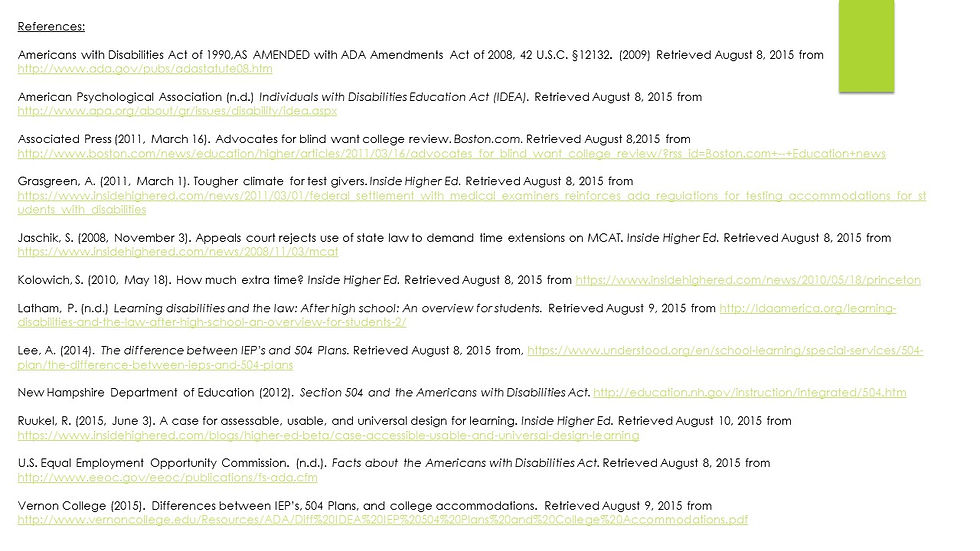

Pope, Reynolds and Mueller (2004) defined multicultural competence as "the awareness, knowledge, and skills needed to work with others who are culturally different from self in meaningful, relevant, and productive ways..." (p. 13). Within the course Multicultural Issues in Student Affairs, I was able to examine key issues related to multiculturalism, diversity, and social justice within higher education, particularly in regards to the cycle of socialization/oppression and the underlying presence of microaggressions. I was also able to reflect on my own identity and whether I existed in a group that was dominant or marginalized. Within their Conceptual Model of the Multiple Dimensions of Identity, Jones and McEwen (2000) explain how individuals have a core identity that is reflective of their race, class, religion, gender, sexual orientation, and culture. Each of these areas has varying levels of significance to the individual, and therefore the identity we perceive for ourselves and how we are viewed by others may not always align. When interacting with students and other individuals, it is important for me to acknowledge that there is more than what is initially seen. They, like myself, have numerous dimensions to their identity and each of these dimensions have served to shape who they are and how they perceive the world --sometimes positively and sometimes negatively. By recognizing the different ways identity is formed and how it contributes to one's life experiences, I am better able to serve the needs of others by being a multiculturally competent student affairs professional.
In order to assist myself in this process, I can utilize the "Characteristics of a Multiculturally Competent Student Affairs Professional" self-assessment developed by Pope, Reynolds, & Mueller (2004). By continuously using this tool, I can identify and develop goals for myself and my office that promote multicultural competence in personal behaviors and actions, as well as in programming for a diverse community of students (Pope & Mueller, 2011).
I was able to apply my multicultural knowledge, awareness, and skills during my time as an intern for the Office of New Maverick Orientation at the University of Texas in Arlington (UTA). I worked collaboratively with orientation leaders to produce what was known as the “College Life Skit,” a short 40 minute play that highlights a variety of situations new students might encounter in college. These situations included roommate conflicts, alcohol abuse, and interactions with diverse individuals (i.e. race, gender, sexual identity). During their training, orientation leaders were informed of the best practices in which to address the concept of diversity when they led the small group session that would occur after the play. Best practices included the dismantling of stereotypes, recognizing the value of diversity in the classroom, well as encouraging participation in diverse types of campus programming.
REFERENCES:
ACPA & NASPA. (2010). Professional competency areas for student affairs practitioners. Washington, DC: Authors.
Evans, N. J., Forney, D. S., Guido, F. M., Patton, L. D., & Renn, K. A. (2010). Student development in college: Theory, research, and practice (2nd ed.). San Francisco, CA: Jossey-Bass.
Jones, S. R. & McEwen, M.K. (2000). A conceptual model of multiple dimensions of identity. Journal of College Student Development, 41:4. p. 405-414.
Pope, R., Reynolds, A. & Mueller, J. (2004). Multicultural Competence in Student Affairs. San Francisco, CA.: Jossey Bass.
Pope, R., & Mueller, J. (2011) Multicultural competence. In J. H. Schuh, S. R. Harper, & Associates (Eds.), Student services: A handbook for the profession (p. 337-352). San Francisco, CA: Jossey-Bass




In the course Current Issues in Student Affairs, our class engaged in a number of discussions related to the numerous issues that currently exist in higher education. Through this course I was able to develop an understanding of the experiences of underrepresented and emerging student populations (such as students with disabilities or students of color), and the role student affairs staff have in assisting these students. One of our discussion posts (see right) focused specifically on the changing demographics of higher education and provided us with the opportunity to reflect on the importance of embodying diversity within institutions among both students and faculty/staff. Within the presentation "Higher Education and Students with Disabilities" I examine current law regarding higher education access for students with disabilities and how the accommodations provided students differ at the high school and college level. I then indicate the impact such laws have on student affairs professionals and what we can do to best support our students.
As student affairs professionals, it is important that we emphasize the value of diversity. Differences in race, ethnicity, gender, sexual orientation, and even areas such as socioeconomic background impact our understanding and interpretation of the world around us and contribute to the formation of identity. Having knowledge of our identity and privileges as student affairs professionals will help us in understanding the identity of others and to better engage in inclusive practices.
Equity, Diversity, and Inclusion
" The Equity, Diversity, and Inclusion (EDI) competency area includes the knowledge, skills, and attitudes needed to create learning environments that are enriched with diverse views and people. It is also designed to create an institutional ethos that accepts and celebrates differences among people, helping to free them of any misconceptions and prejudices."
(ACPA & NASPA, 2010, p. 10)
By familiarizing myself with the multiple aspects of identity I am better able to work with diverse individuals and the institutional community to create a "vibrant, interactive campus" (Evans et al, 2010, p. 250). I recognize that certain aspects of my identity have afforded me a number of privileges within life. For this reason, it is even more imperative that I continue to take a proactive stance against issues of social injustice and discrimination by continuing to develop the multicultural competence of myself, my students, and my institution.
